If humanity is to progress philanthropic resources need to support women’s voices, choices, participation, education, livelihoods and more
In May 1983, the New York Times published an article entitled, ‘Feminist Philanthropy Comes Into Its Own’, highlighting the growing number of foundations and giving circles established to redress years of philanthropic neglect of women’s issues. This movement of feminist philanthropists had their passions and motivations rooted in deep-seated anger over retrogressive realities and experiences of systemic oppression and marginalisation of women, girls, trans and gender non-conforming people across generations, communities and continents.
As this special feature aims to give readers an overview of current feminist philanthropy, and inspire different types of funders to work closer together, it seems fitting to affirm at the outset the anger that drove women to create their own solutions to their unhappiness, generational trauma and denigration. These solutions matched in magnitude, intelligence and resources the factors supporting the dominant systems and structures that reinforced and sustained their pain: patriarchy, heterosexual hegemony, capitalism, white supremacy, neo-liberal and imperialistic agendas.
Feminist philanthropy is more careful than any other kind of philanthropy not to replicate exploitative dynamics of power.
By the turn of the century, more individual and community philanthropists and private foundations began to prioritise women, girls, trans and gender non-conforming people’s issues. Today, some governments are now adopting feminist approaches to their international development agendas, among them Sweden, Canada, France and Wales. This is a recognition that more resources need to support inter alia women’s voices, choices, participation, education and livelihoods for humanity to progress. With all the excitement generated by newcomers to the feminist funding spectrum, we should acknowledge earlier feminist philanthropists such as Anne Firth Murray, Tracy Gary and Kim Klein who were at the forefront of championing just, caring and participatory ways of giving to communities, just as they were in the vanguard of pointing out some fundamental socio-political and economic issues that mainstream philanthropy is only catching up to today: violence against women, the crisis of democratic institutions and growing inequality.
What is feminist philanthropy?
Feminist philanthropy is more than funding women’s issues. According to Fondo Centroamericano de Mujeres, a women’s fund in Nicaragua: ‘Feminist philanthropy is not a charitable act or an act of power. It is an act of solidarity and mutual empowerment, in which the solutions to the problems that women face are seen as a matter of mutual responsibility.’
Nor is it just financial giving which is important. Global Fund for Women’s founder, Anne Firth Murray, writes, ‘It is the “how” that has the power to transform systems, structures, attitudes and behaviours of both the people who give and their recipients, not the “how much”.’
Feminist philanthropy is a political act. It is an act that seeks to challenge and transform notions of power, privilege and resources. Its approach to supporting activists and communities recognises that those communities have intelligence, power and resources to contribute to transformations and that money plays a complementary role. The argument made by feminist philanthropic activists and scholars is that when groups of women who are self-led have money directly put in their hands, they are more equipped to challenge the laws and practices that perpetuate their oppression and marginalisation. The feminist movement in Ireland which has advocated for progressive laws on abortion rights is but one example. Feminist philanthropy proposes a horizontal model of social relations, inspired by solidarity and based on the trust between funders and activists. In this sense, it has much in common with all of philanthropy aiming for social change. Building resilient autonomous feminist institutions has proven the most effective lever for social advances, globally.
Understanding power
Feminist philanthropy is informed by a power analysis. Power within elevates the agency, voice, wisdom and choices which women and communities possess. Power to provides the ammunition to destroy systems of power that oppress and marginalise women and their communities. Power with inspires co-creation, movement building and power-sharing to fight for social and gender justice, equality and equity. All these types of power are involved with dismantling hierarchical forms of philanthropy that are based on power over exemplified by institutions that purport to know it all, control resources and see communities as needing ‘help’. Feminist philanthropy is more careful than any other kind of philanthropy not to replicate exploitative dynamics of power.
Women’s funds are often the first source of funding for groups overlooked by mainstream philanthropy.
In an article on the principles of feminist philanthropy, Caitlin Stanton, Kellea Miller and Esther Lever argue that feminist philanthropy brings changes in two ways: where the resources are coming from and where they are going to. This is not a linear but a circular model that recognises the importance of giving both to the givers and the receivers, apportioning them equal power to contribute to the achievement of women’s rights, gender and social justice. This is perhaps best exemplified by FRIDA’s participatory grantmaking model featured in this .
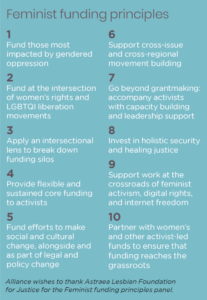 Being intersectional
Being intersectional
Women’s The fact that women’s funds live and breathe feminist philanthropy values and principles gives them legitimacy.
Women’s funds are also acutely aware of intersectionality. For Astraea, intersectionality is one of the principles of feminist funding. Lines of gender oppression intersect with other forms of discrimination. For example, the fight for racial justice is deeply connected to a number of other issues – misogyny, heterosexual hegemony, sexual and reproductive rights, sex workers’ rights and migrant justice – because people of colour are disproportionately affected by health, immigration, labour and criminal justice policies.
In challenging prevailing economic systems, feminist philanthropy acts against the exploitation of public goods and natural resources. Such exploitation destroys ecosystems and hastens climate change while disproportionately affecting the poor and powerless who are mostly women and children. In supporting this work feminist philanthropy promotes the active participation of women in decision-making and the governance of natural resources. This aspect of feminist philanthropy is well illustrated by the work of the Global Alliance on Green and Gender Action, featured in this issue . To resource movements intersectionally is to address the greatest systemic factors that sustain injustice.
Feminist philanthropy understands the power of voice. It is committed to supporting and creating spaces where voices of women shape discourse, policies and perceptions.
The intersectional approach in practice is well illustrated by the case of Sudan, where diverse movements including businesspeople, religious and cultural groups, the creative sector and the LGBTQI movement came together to play a critical role in ousting President Omar Al Bashir. Feminist philanthropy contributed to fuelling the movement, sustaining the momentum and is now helping to strategise on women’s participation in the country’s transition period.
Body politics
Women’s sexuality and reproductive health and choice are significant in the deconstruction of patriarchy so feminist philanthropy values bodily individuality, autonomy and integrity upon which layers of political discourse and dispensations are placed. It prioritises women, girls, trans and intersex people in its work. Our bodies are political sites and therefore feminist philanthropy ensures that body politics is central to conversations on money and power.
Feminist philanthropists don’t hurry constituencies and demand results after six or ten months. They are patient because, coming from the movement, they understand what being in the trenches feels like!
Such questions are often undiscussed, especially among groups who are virtually unrecognised. Feminist philanthropists therefore consciously support abortion rights, sex worker rights and LGBTQI rights. In 2014, transgender activist Audrey Mbugua from Kenya and an Urgent Action Fund-Africa grantee, won a landmark case when the country’s high court ordered the Kenya National Examinations Council to change the gender marker on her academic certificates. The verdict set a legal precedent that expanded gender justice in Africa and gave other gender non-conforming people an opportunity to have their identity acknowledged.
Solidarity is what has shaped the #Metoo movement that has seen thousands of women, girls, trans and gender non-conforming people share their experiences of sexual harassment leading to changes in policy at government and institutional levels. The recent #Totalshutdown hashtag in South Africa has also created solidarity among African women against sexual, physical, emotional and economic violence against them.
Amplifying voices, care and well-being
Feminist philanthropy understands the power of voice. It is committed to supporting and creating spaces where voices of women shape discourse, policies and perceptions. In most countries it is a few women with courage to stand up to oppression who speak on behalf of others, as is the case with women’s human rights defenders working in very tough situations. Mama Cash is an instance of a women’s fund that supports women, girls and trans people to tell their stories and influence the communities where they live and work. This support takes many forms, including advocacy in parliaments and the use of media to set agendas and change norms. Such work can be risky and the lives of women and gender non-conforming activists and those close to them can be put in danger. In recent years feminist philanthropy has placed emphasis on the well-being of people at the forefront of feminist activism. Examples of this are provided by Urgent Action Fund-Africa which is leading the process of establishing The African Women’s Human Rights Defenders Platform – aka The Feminist Republik – and FRIDA’s care model described in these pages.
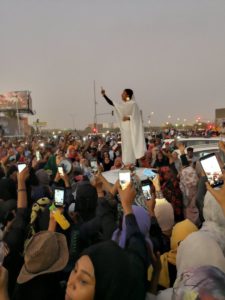
Young Sudanese student Alaa Salah came to symbolise the protest movement against the country’s president.
In all of this work, it’s important to appreciate that gender equality and equity work is process-oriented, slow and painful. Above all, because they come from the movement themselves, feminist philanthropists understand how arduous the dismantling of poisonous systems and structures is, how draining is the winning of hearts and minds to the cause of women’s rights, gender and social justice. Perhaps more than any other form of philanthropy, feminist philanthropy needs patience. Things take as long as they take. Feminist philanthropists don’t hurry constituencies and demand results after six or ten months. They are patient because, coming from the movement, they understand what being in the trenches feels like!
Non-feminist funders often claim that they do not want to discriminate by ‘singling out’ women and non-binary people but that simply reinforces the power bias. When we enjoy privileges, what seems to be neutral is really not.
We write in a global context where the equality which underpins democratic societies is eroding. Religious fundamentalisms, which are profoundly gender-unequal, in some cases to the point of ‘gender apartheid’, are gaining momentum. The machinery of power and the associated systems that give rise to the oppression of women are facing confrontation at every turn. In this decade alone the visibility of feminist activism and mobilisation have risen dramatically. In Sudan, the role of women during the protests that have transformed the country and the government has been critical and women have been at the forefront of this movement. The restrictive environment in Sudan which essentially polices women’s movement and association resulted in them using innovative ways of resisting. The women transformed Facebook groups to expose members of the security forces abusing their power. Women marched on the streets and rallied one of the largest protests in the country. Not only in Sudan, women in Uganda, Nigeria, Algeria, India, Fiji, Honduras and elsewhere are lending their voices, energy and movement towards radical social change and a society where women’s bodies, presence and abilities are respected.
Yet attacks on the democratic institutions which offer protection for women are continuing. For example, on 14 November 2018, the Kenya Medical Practitioners and Dentist Board ordered Marie Stopes Kenya to cease abortion related services in all its facilities within the republic of Kenya. Feminist philanthropy is a mainstay in fighting back and it is needed more than ever.
Gender blindness reinforces the status quo
So why is more support not forthcoming? Non-feminist funders often claim that they do not want to discriminate by ‘singling out’ women and non-binary people but that simply reinforces the power bias. When we enjoy privileges, what seems to be neutral is really not. Northern-based philanthropy needs to get over its claims to be ‘gender blind’. The board, leadership and staff teams of northern foundations will need to get more comfortable with the theme of ‘difference’, with power-sharing and with funding relationships based on trust. And people with proven gender expertise and experience need to be in leadership positions.
In Mexico City this August, a group of feminist activists met to set a strategy for the 25th anniversary of the landmark UN World Conference on Women, held in China in 1995, which produced the Beijing Platform for Action. They had this to say: ‘In marking the Beijing+25, we must celebrate and affirm gains we have made in… advancing women’s human rights; harness our rage at the crises confronting our communities and ecologies; build on the hope of women’s mobilisation and transformative actions; and take collective action to forge solidarity with other resistance and liberation movements, demanding accountability of states and the private sector.’
We hope that this special feature points up some of these new directions and, most importantly, gives you the inspiration to join us in the tasks which lie ahead.
Ise Bosch is founder of Dreilinden.
Email: ise.bosch@dreilinden.org
Twitter: @dreilinden
Ndana Bofu-Tawamba is executive director of Urgent Action Fund-Africa.
Email: ndana@uaf-africa.org
Twitter: @UAFAfrica

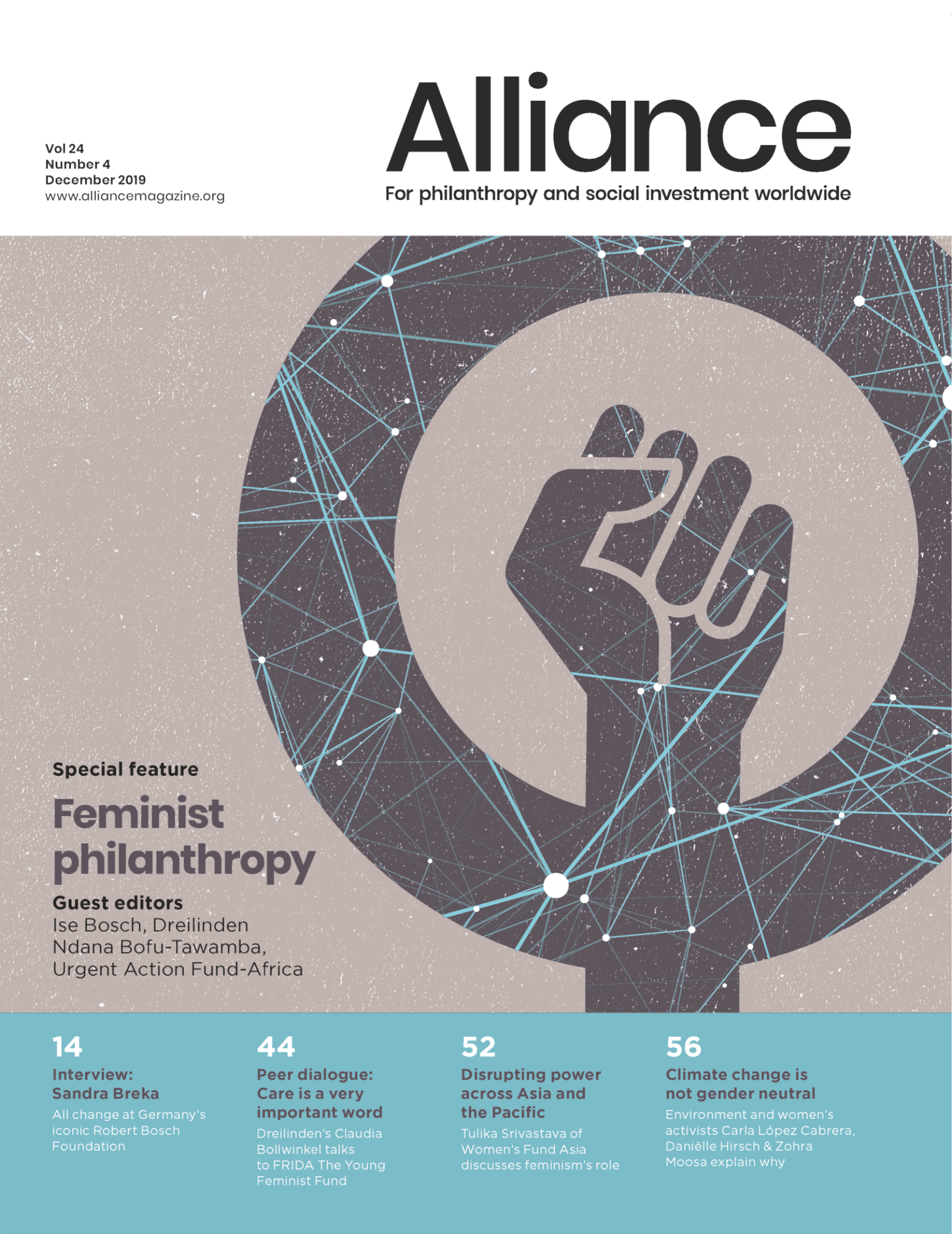
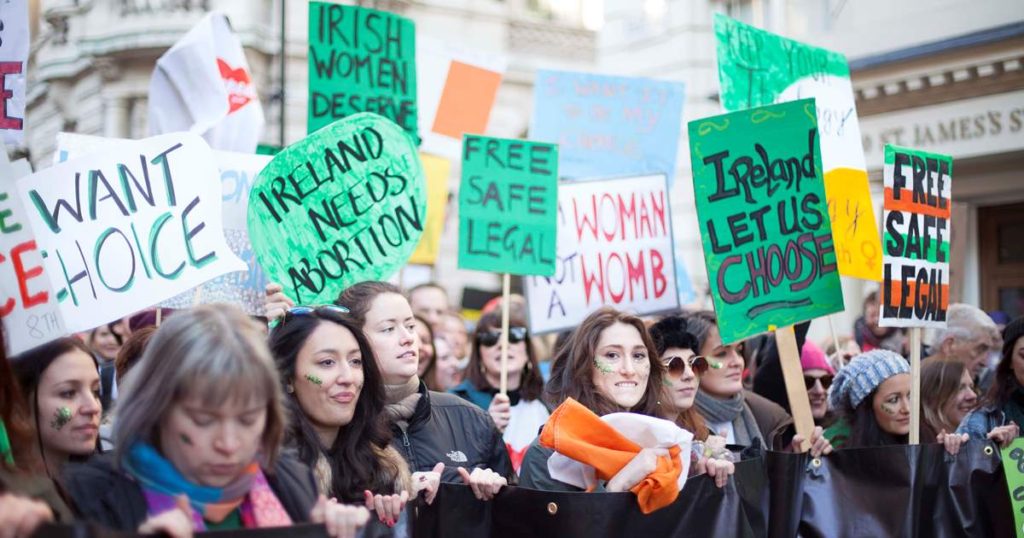



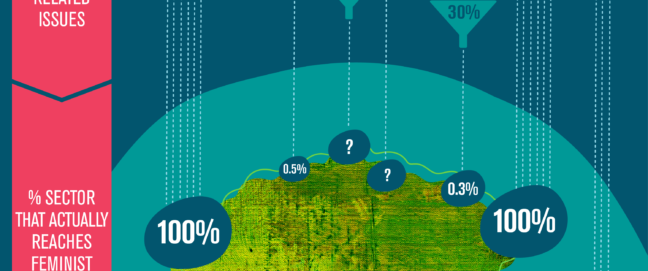

Comments (3)
Many, many thanks for this interesting article! I have just read the printed copy of this issue on feminist philanthropy and I firmly believe it is time to talk more about such topic. I have been asked to talk about women and philanthropy at the first Italian Conference on "Women and nonprofit": reading your thoughts has been a dive into different perspectives linked by the need to spread the voice about what feminism and philanthropy can be intended nowadays.
This is a bit of a broad sweeping brush giving feminists credit where it is not due. I appreciate it for celebrating the success of PoC feminists in philanthropy. However, there are plenty of academic articles (Hayhurst and others) demonstrating just how far white feminists still have to go in embracing intersectionality. Given where the vast majority of wealth lies in Western countries, it would have been good to point out just how far we still have to go to really shift the balance of power, and for white female philanthropists to truly dedicate resources to race, class and gender inequalities. Currently that is not the case.
Ise & Ndana - thank you! Hope this article will help open more minds & eyes. But from my experience over the years in Nepal, women have been having to be the only peace builders, safety nets, bread winners, care givers, environmentalists and much more. But until now even I struggle for resources for the cause I am moving. Those who are helping in increasing inequity gaps & are polluting the planet are they not responsible?! We have been holding up the world for ever! We have been on the same side for so long and yet our gaps only increase!